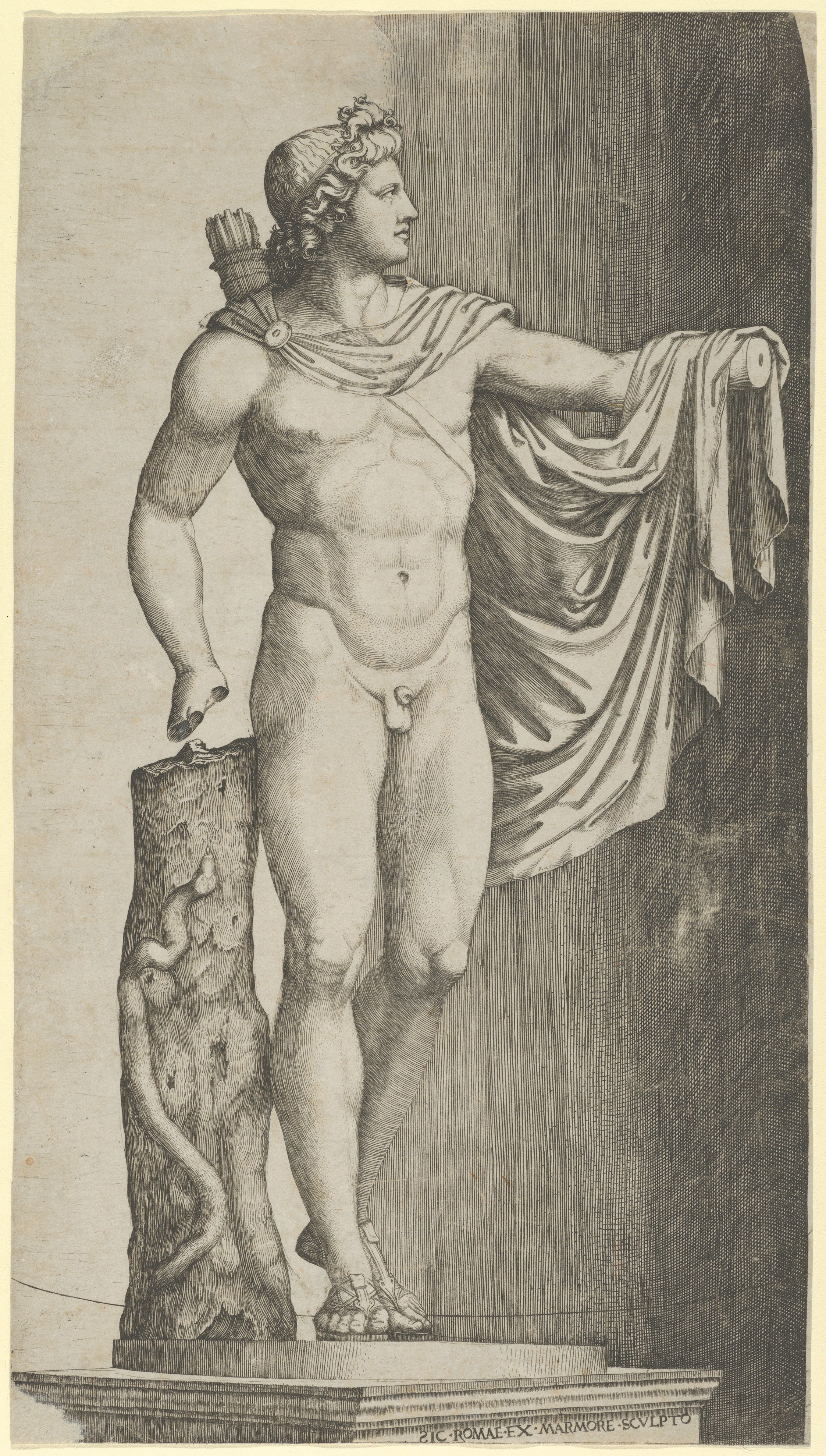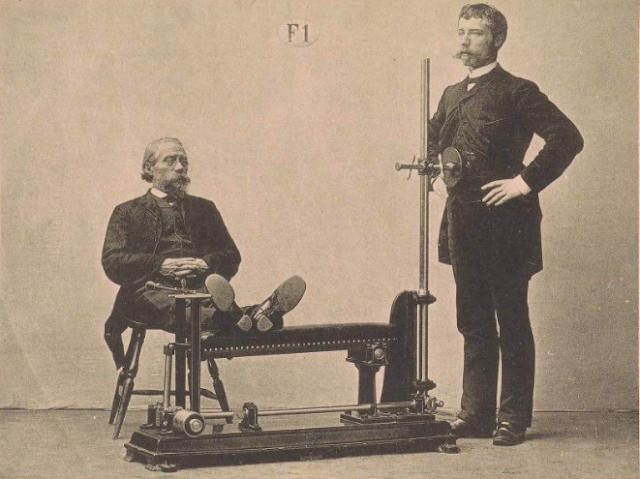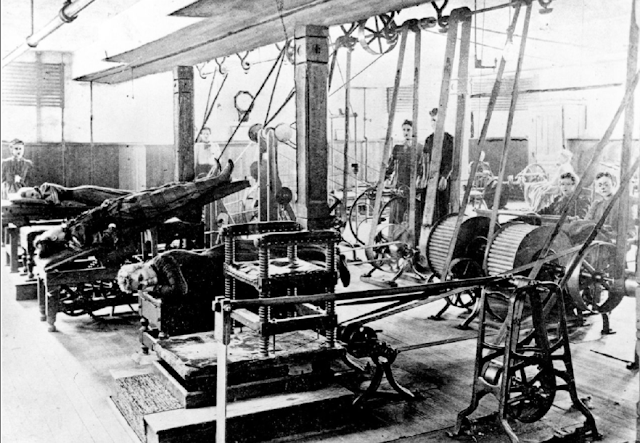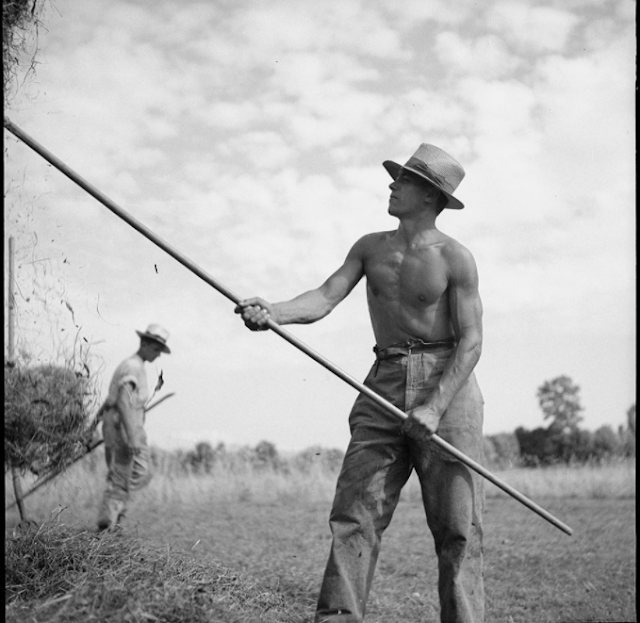Adrian Bell, Corduroy, 1930
Another New Year: a time for reflection and perhaps some solemn undertakings, a.k.a. Resolutions*. One such trope invariably involves some, ahem, reworking of the Shape of Man, especially if that shape is somewhat not as one expected after the Feasts of the Seasons and stands in contemplation before the pristine empty calendar, wondering ... The time is thus nigh to air some Opinions on a subject about which Your Correspondent is eminently unqualified. So today, Dear Reader, I bring you the topic of Gentlemens' Exercise.
Take a poll of your average Gentleman Gym Attendee, asking him for why he toils so vigorously at the pulleys and levers of his equipment or shakes the great heavy python of a shipyard stevedore's rope that I see sometimes in the window of the gym next to our greengrocery, and I would hazard a guess he is not trying to consciously replicate the physique of our labouring forebears by play-acting their working day and would be frankly offended by such a proletarian suggestion.
But whatever his answer may be, the bare fact remains that the ceaseless walking riding fighting tilling ploughing threshing building woodchopping &c. &c. of the pre-Industrial Revolution Man led to a physical profile** much like what the gym-goer generally aspires to. Modern Life has more or less undone the elementary Shape of Man from what was quite unremarked upon in Olden Times. Hence so much of the equipment appears to replicate the former tools and actions of the chores of the past. Just with mirrors and loud music and for short bursts instead of mud and muck or raging seas for hours at a stretch.
One of the Two Peas once invited me to her own gym a few years ago, at the height of
Poldark-fever, wherein they had a poster exhorting some extra commitment to the machinery with the infamous image of Aidan Turner as my
former amour standing bare-chested scything in a field, captioned 'Get in Shape for Summer'. It wittingly or not constituted a knowing wink at the true design of the expensive equipment.
 |
The Apollo Belvedere
Sans pants to best show off his Poupart ligament
Marcantonio Raimondi C16th engraving |
But we can cast back even further for some manly shapes as inspiration for today's gym-goer. Indeed, once even to the epitome of aesthetic perfection itself, in the words of Mr. Wiki. Some two decades ago, as a mania for Ancient History swept over me, I undertook several courses at the WEA under the expert tutelage of an historian and archaeologist whose font of knowledge on the subject was as gospel to me.
Until one day when he was presenting some images of classical statuary, including Dear Apollo above, and I heard words to the effect that the ancient artists sought only to create idealised versions of the human form, for there is indeed no musculature foundation for what later might be termed as the Heroic Cuirass.
My pen stopped suddenly on the page. Hullo, what ...? You, Sir, need to get out a bit more! For sure the ligament above the groin to which he was pointing on the overhead slide may have been rather crisp along its line and a bit exaggerated in its bold baldness but I'd seen one or two in my time. In the flesh, as it were.
 |
The philospher-thinker not likely to be a model for Polykleitis
[But a very likely template for the Lockdown Physique] |
Not to mention that the likes of Polykleitis, whose work we were probably discussing, would have used a live model for their bronzen glories. Perhaps not your sit-around philosopher-thinker but likely the soldier-athlete or perhaps even a fetching farmer-labourer variety for whom either the gymnasia or the baking fields incubated such muscly forms. Of course, neither pointing out this bit of obviousness nor an unseemly digression into the private life of a front-row student was about to happen on my watch, so I let the matter slide uncorrected.
But I was left wondering about the very nature of the human condition in that we can become ignorant, or just forgetful, of our natural physical potential once we leave the slog & toil of an agricultural and labouring past and settle down evolutionarily-speaking onto our sofas after a long day at a desk.
In the century before the canny Suffolk farmer, too, made his observation about the physical effects of abandoning the fields of toil for a desk job to city-boy-farming-apprentice Adrian Bell in 1920, in Bell's lyrical 1930 memoir Corduroy, another made his mark in a more remarkable way. Enter one Dr. Gustave Zander, inventor of the Medico-Mechanical Gymnastic Devices that sought to rectify the enfeebled bodies of the Modern Man with an hour of targeted exercises a day.
 |
Zander's Abdominal Kneading Machine a.k.a. H1
Prescription: 2 minutes of piston-powered pummelling of the tummy
|
The Swedes had been all over the subject of a scientific basis for exercising the body of desk-jockeys for health and vigour in the nineteenth century, starting with one Pehr Henrik Ling who invented gymnastics, calisthenics, physical education and also Swedish massage as the sweetener for all that exertion. Dr. Zander then took these ideas further in the 1850s by properly marrying them with the ingenuity of the Victorian age and invented machines to isolate muscles and work them in a controlled environment.
 |
Zander's Vibration Machine, a.k.a. F1
Take a seat for some lower leg vibration or sit astride for a perineal shake
While your gym buddy stands up for a spot rub |
Zander Mechanico-Therapeutic Institutes sprang up around Europe and the Americas, and people even bought individual machines for the home, the F1 being rather popular.
 |
Zander Velocipede Motion Device, a.k.a. B7
No instructions required |
Some of the devices were more familiar to any modern gym-goer today, while others required a close reading of his
published description of his apparatus to figure them out. Yet others were specifically designed to help iron out the skeletal wrinkles of scoliosis sufferers, which was a pet subject of his.
 |
Zander's Abdominal Rolling Machine, a.k.a. J6
This apparatus "vigorously" promotes emptying of the intestines through
Circular abdominal friction |
The Kellogg Sanitorium was one of the institutes which embraced the Zander Method and had a "Swedish Movement Room" full of his machinery, looking not too dissimilar to a modern Pilates studio.
 |
| Plenty to be getting on with at the Battle Creek Kellogg Sanatorium |
While some of this looks to verge on quackery, our Dr. Zander was short-listed for the Nobel Prize for Physiology or Medicine in 1916! but, sadly, there was no banana that year, what with a war going on. Which was rather a pity as he and his methodology may have had more of an influence on modern exercise than just being reinvented as today's Nautilus machine, for he also had some rather interesting things to say about the etiquette for engaging in a bit of gym time:
Viz.: Arrive quietly and in good time; perform your movements quietly; focus on what you are doing with no chatter or reading; if you are exercising to assist general debility, dancing and late nights are to be avoided; no big meals beforehand, just a cup of tea, coffee or milk and a roll, which are essential if you are elderly or enfeebled; and loose, comfortable clothing is to be worn, as illustrated throughout, avoiding tight neckties, tight garters and corsets.
As the machines were driven by steam, gas or electricity it would no doubt be rackety enough inside the Institute, so I do like the emphasis on solemn shush as you go about rectifying your enfeeblements.
He was also wise to the chronically lazy ("patients whose weariness is obstinately persistent") and forecast that many would "abandon the cure too soon". Sounds all too familiar even today. A man truly ahead of his time.
 |
Zander's Foot Friction Machine, a.k.a. J4
Modelled with regulation active wear |
* Or not, as a piece in the news today concerned the plight of the fitness instructor and gym operator bewailing the unlikelihood this year of the annual bonanza of the New Years Resolution of Getting-Into-Shape with a gym membership that never amounts to anything.
** Before it probably broke the said Man. As they say, too much of a good thing ...
Image credits: 1: Gustave Roud; 2: Metropolitan Museum; 3: Flying With Hands; 4-7, 9: Internet Archive; 8: Willard Library









Dear Pip - what an interesting tour de force! Not THAT different from our fitness studios of today - the machinery resembles a lot. The studios are in a crisis - I worked out in Berlin in a very well-equipped one, and on the second floor had the full view of beautiful males, deeply absorbed into themselves, added by mirrors. A mask is so unbecoming, though it doesn't hide the aim of training :-)
ReplyDeleteWhen I glance at your first photo of a Swiss farmer, the world-wise woman in me chuckles a bit and mumbles "All that glistens isn't gold" ( he might not be what we call a lady's man but more a gentle man, and he might not be a farmer - but that is forgiven when we look at that beautiful body).
When I saw the postcard with the philosopher-thinker I thought it actually WAS a postcard of Corona-time! :-)
Great reading, thank you - now I have to hurry to my Giardino Segreto, skip, skip, skip...
Thank you, dear Britta, and do remember to keep those knees up! Yes, some of the machinery does look rather familiar except, of course, for the liberal application of C19th embellishment and brass stud-work on the padded bits, for these machines must be Beautiful as well as Therapeutic. I do wonder now whether mirrors were originally meant as a distraction from the plain and otherwise visually unstimulating modern equipment. A bit like a mirror for the budgerigar in a boring cage gives it something pretty to look at. And do you doubt my Swiss farmer's bona fides :)
DeleteThe Battle Creek Kellogg Sanatorium looks remarkably similar to many of todays gymnasiums. However, most of them appear to be relaxing or resting rather than exercising. In contrast the gyms today look very regimented with row after row of bodies working out in their figure hugging lycra.
ReplyDeleteThey are rather curious poses for exercise, dear Rosemary, but I rather fancy some of the Sanatorium patients were on devices to aid scoliosis, where one used one's own body weight under gravity to counteract the curves for a while. The perfect opportunity for chatting with your neighbour except for it being verboten, for this is a serious enterprise. But nevertheless a reminder that lycra is not an essential tool for staying in shape!
DeleteJust mind-boggling:
ReplyDelete"The upward stretched arm is moved outward and
downward iintil [sic!] it hangs straight down. The movement
is made first with one arm, then with the other."
I already see myself regaining the Adonis-shape I used to have in the past millennium; and you can't, of course, know how thankful I am, Lady Pipistrello.
I am leaving you for now with one upward stretched arm moved outward [...].
Yours sincerly.
Dear Sean, you may mock the rigour of Dr. Zander but he Almost Guarantees pleasing results. And if you need further top-shelf endorsement for the renown of his devices for Adonis-regainment, you shall find it at the bottom of the mid-Atlantic Ocean where the ghostly remains of a Zander-equipped gymnasium lies within the RMS Titanic!
DeleteLuckily I am blessed with the body of Adonis, and have no need for such devices. However I do rather like their Gym-Kit. H1 is a tad baffling, it looks more like a torture implement (rack) than anything to do with fitness.
ReplyDeleteOh, I dare say it only takes a couple of turns around Haddocks for you to maintain the gifts the gods blessed you with, dear Cro :) Not even reading through the specs for H1 again shed any more light upon its purpose. Mechanically polishing the buttons on the waistcoat of your three piece suit, but to what end?
DeleteEva (via email):
ReplyDeleteHappy New Year Pipistrello!
No New Year resolutions and gym membership here. I prefer my exercise in fresh air minus contraptions. But I must admire the attire of the gentlemen showcasing Zander's creations . They felt the need to be properly dressed for the occasion. Today gym attire is worn to the supermarket and restaurants making it all rather baffling. How much time are people really spending at the gym?
Bright salutations to you, too, dear Eva, and you pose a question which cannot fail to be on the lips of anyone around these parts! There is much to be chewed over by this phenomenon. But so much lycra-cladding of nether-regions being paraded at all hours and in all situations entirely unrelated to exercise does seem that we may've Missed the Memo that showing off your bits, whether worthy of sculpture by Polykleitis or not, is now The Law. Perhaps our new National Uniform is meant to send a message to the world that we could be ready to spring into action at a moment's notice?
DeleteI’ve never stepped inside a gym ….. a brisk walk and a few hours gardening hopefully does the trick for me. Haven’t seen much of the lovely Aiden Turner lately, more’s the pity ! XXXX
ReplyDeleteDear Jackie, why does that not surprise me? You are too stylish for such pedestrian venues. If all the devices were steam-punked up and the attendees suitably attired, who knows, you may have been curious enough? Neither have I seen the lovely AT lately. I wonder where he'll next pop up? xx
DeleteI FIND THIS ALL SO FASCINATING!
ReplyDeleteWAY BACK THEN THEY HAD THESE MACHINES!I WONDER WHAT THEY WOULD THINK ABOUT TODAYS APPAREL FOR SUCH A THING!YOU ARE SPOT ON ABOUT THE GYM LOOKING LIKE TODAYS PILATES ROOMS.........I have seen one of those rooms since the start of the PANDEMIC!I have my doubts I NEVER WILL AGAIN.....
THANK YOU FOR SUCH AN ENTERTAINING POST!XXX
Dear Contessa, the Victorians and Edwardians would no doubt laugh merrily at the modern notion that such scanty clothing is required to get oneself into undignified positions. Well, maybe not laugh as they'd probably think it positively scandalous! Happy to entertain you dear :) xx
DeleteI worked out in a gym for a time in my 30s. I never looked terribly buff, but did feel strong like I could lift my sofa without any help. :)
ReplyDeleteCan I just say that that Swiss farmer is looking rather well?
Yes, dear Bea, he looks very well. And I'm sure there's a bit of Poupart ligament action beneath those Harry High Pants. As for potentially lifting your sofa, that's a mighty achievement!
DeleteThat book of Adrian Bell is the one I said I could not bear to read! Fancy that it should turn up Down Under. I picked it up a year or so ago. He used to write in our local paper and his son was the war reporter and MP Martin Bell. A clever family.
ReplyDeleteHe's a beautiful writer, dear Rachel, and I'm reading a selection of his newspaper pieces as well as his memoirs. "A Countryman's Winter Notebook" is his rambling observations published through winter - all while I'm in a sultry Sydney summer, of course. A bit of mental air conditioning!
DeleteIf I looked like The Apollo Belvedere I would be very concerned about one part of me. What a strange depiction.
ReplyDeleteAh, I see what you mean, dear Andrew, a life without hands is rather concerning ... or might you be frowning at the little button in the No-Pants Department?
DeleteI had not even noticed the missing hands, so concerned was I for the poor fellow's other apparatus.
DeleteThat poor little button is the result of an injury in the name of modesty. He rather hoped no-one would notice! It seemed our Apollo sported a fig leaf for a time.
DeleteWell I would certainly be looking for a fig leaf smartish if I was equipped like him.
Delete...or even if I didn't look like him, I suppose. Those (rather frequent) dreams when I am walking through town bollock naked, albeit with my shirt and jacket on, usually, are most alarming, although nobody ever seems to notice. Disturbing. What does it all mean Dr Pip?
DeleteThe no pants situation would be completely unremarkable, dear Andrew, and no-one notice if you are a character stepped from the pages of Beatrix Potter. Is this something you feel needs exploring further?
DeleteBest move on I reckon...
DeleteThe Foot Friction Machine looks like my sort of thing and is in my view well overdue for re-invention. I'd like to read Corduroy, I have fallen in love with it from the quote alone.
ReplyDeleteI'm with you there, dear Jenny, the Foot Friction Machine is most appealing and tho' Dr. Zander cautions against reading whilst enjoying his machines, a book does cry out as the ideal accompaniment. To whit, the soothing words of Corduroy are highly recommended.
Delete